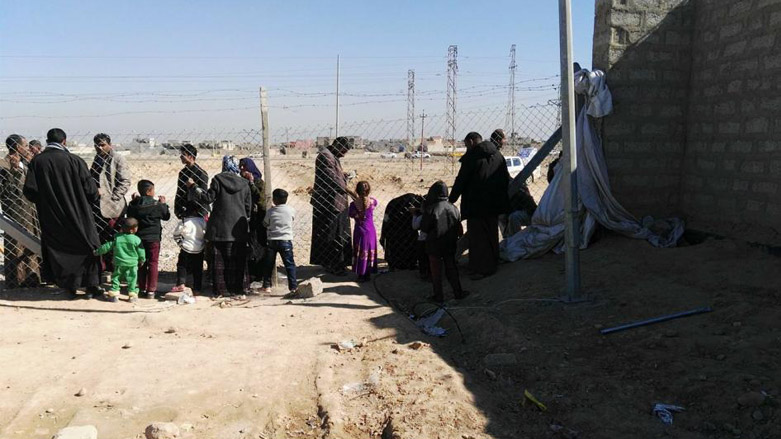Iraqi forces block returning families who fled Islamic State: HRW

ERBIL (Kurdistan 24) – Iraqi checkpoint officers have blocked families who sought to return to their home after the Islamic State (IS) displaced them while invading Anbar governorate in 2015, an international human rights group reported on Sunday.
The soldiers “at two checkpoints in Anbar governorate have arbitrarily prevented a group of displaced families from returning home in what appears to be an act of collective punishment,” a statement released by Human Rights Watch (HRW) read.
“The families were taken to camps for displaced people in Anbar after being blocked from returning in late February 2018 and again in early June,” the statement continued.
The families are from the Sa’ada tribe, whose members have been accused of affiliating with IS, Anbar residents had told HRW.
The area the displaced persons want to return to has been under government control since 2015 after a massive campaign by the Iraqi Security Forces (ISF), with the aid of US-led Coalition forces airstrikes, liberated the areas and expelled the terrorists from the region.
“Baghdad authorities have rightly said many times that families from areas retaken from [IS] should be able to return to their homes if they want to,” HRW’s Lama Fakih had said, adding that the stance is “in direct contradiction to the central government’s orders to facilitate safe and voluntary returns.”
HRW had interviewed three residents of al-Khalidiya Central Camp for Internally Displaced Persons (IDPs) in May. The individuals are originally from Anbar province’s al-Baghdadi town which lies just 180 kilometers to the northwest of the Iraqi capital of Baghdad.
The families had fled their hometown in August 2014 after the anti-IS forces fought the extremists with ISF recapturing the town six months afterward. But so far no one has returned.
The persons HRW interviewed said they had applied camp managers for security clearance to return home in early 2018 as part of a group of 51 families from the same town and camp.
The camp’s managers affirmed the families’ passes to return home, which a representative of the Iraqi Prime Minister’s Advisory Council later in June denied after an HRW inquiry into the case.
However, after 18 of them took a governmental bus on the exodus home in February 2018, they were promptly stopped at a checkpoint, and after inspecting the peoples’ IDs, they were refused entry, with one of the interviewees claiming “they didn’t give us any reason why.”
A sheikh of the tribe the IDPs belong to told HRW that an ISF commander had assured him that the town’s (al-Baghdadi) officials were pressuring them to provide the blockade against the returnees.
The Mayor of al-Baghdadi had alleged that the families were barred from returning because they were IS supporters.
In many cases where people are blocked from returning to their towns, Iraqi authorities have contended, as on other occasions, that families related to IS suspects cannot remain in their communities for their safety.
The issues with security clearances are compounded as some families are stopped at a checkpoint returning home and authorities send them to secondary camps creating bureaucratic entanglement.
HRW demands that “Baghdad authorities should take transparent steps to sanction all officials, including from Iraq’s military and security forces, which prevent people from returning home unlawfully or as a form of collective punishment, including considering criminal charges where appropriate.”
“Imposing collective punishments on families, villages, or entire communities [who are innocent of crimes] is strictly forbidden and is a war crime.”
HRW also says that aid groups’ members monitoring the returns in Anbar have reported the situation with al-Baghdadi families “is just one of many similar incidents.”
Editing by Karzan Sulaivany
